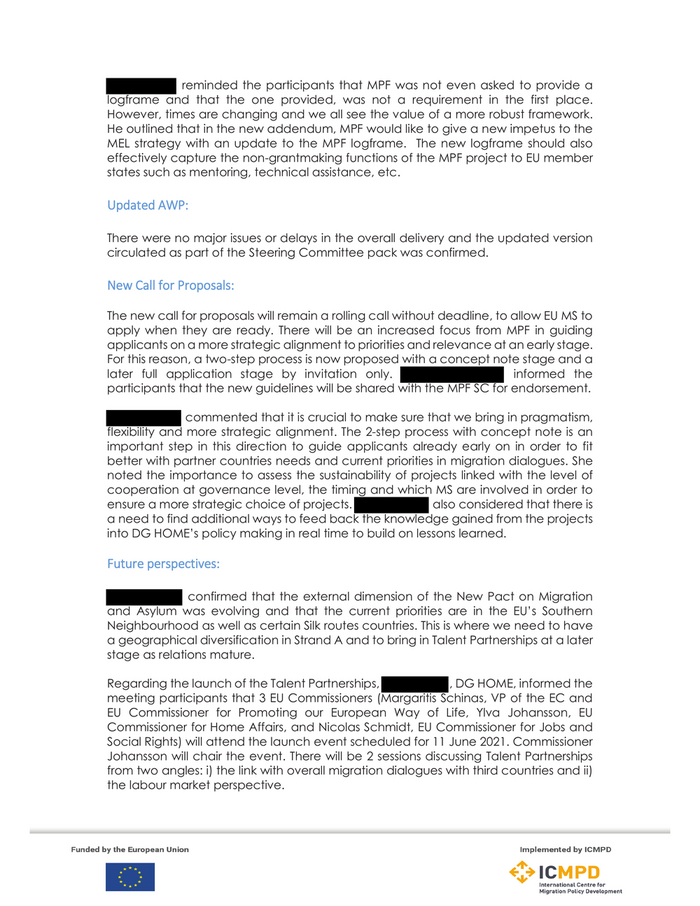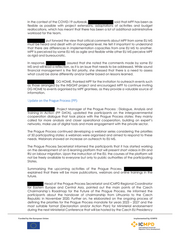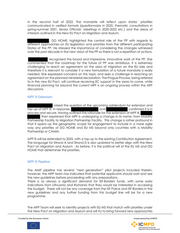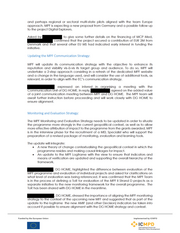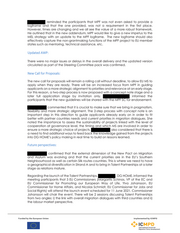mpf11thscmeetingminutesfinal-redacted
Dieses Dokument ist Teil der Anfrage „correspondence ICMPD“
Ref. Ares(2022}4695334 - 27/06/2022 Eleventh $Steering Committee Meeting 27 May 2021, 10.00 - 13:00 Online Meeting via WebEx Minutes Funded by the European Union Implemented by ICMPD Rn Bi <>ICMPD I Cent: Migration Policy Development

Participants @ec.europa.eu DG HOME @ec.europa.eu DG HOME DG NEAR DG INTPA DG HOME @ec.europa.eu DG HOME @ec.europa.eu DG HOME @ec.europa.eu DG HOME @ec.europa.eu DG HOME @ec.europa.eu DG HOME @ec.europa.eu DG HOME @eeas.europa.eu EEAS @icmpd.org ICMPD ICMPD ICMPD ICMPD ICMPD ICMPD ICMPD ICMPD ICMPD ICMPD ICMPD ICMPD ICMPD Record of Proceedings Opening remarks: The chair of the Steering Committee on DG HOME side JE - expressed her warm welcome to the participants and made opening remarks with special focus on the New Pact on Migration and Asylum, stressing the importance of MPF in building confidence in the migration dialogues. She explained that the implementation of the external dimension of the new pact is now in full swing and that DG HOME's objective is to develop the strategic aspect of MPF in order to build on long-standing commitments. The Head of ICMPD Global Initiatives — - extended a welcome to all the parficipants in the I11'P MPF Steering Committee Meeting, taking place in virtual environment via the WebEx online tool, due to the COVID-19 pandemic restrictions. Funded by the European Union Implemented by ICMPD Ei &>ICMPD International Centre for Migration Policy Development

He reported on the latest achievements of MPF and observed the shift from ‘mobility’ to ‘migration’ in the MPF language and the existing link to the upcoming addendum, stressing that this evolution represents a positive adaptation of MPF to the changing migration landscape. The meeting started with a virtual “Tour-de-Table” – participants presented themselves and the institutions they represented. The MPF Senior Project Manager - - introduced the agenda topics (see the meeting agenda) and opened the meeting with key highlights of the tenth interim report of MPF. Tenth interim report: The Progress Report for MPF II has been submitted. shared with the participants the highlights from the period, which included a highly-attended workshop: “From Pilot Projects to Talent Partnerships: Exploring the future of legal migration to the EU” held in February 2021. She presented a quick overview of the current B2 Knowledge Management initiatives, including the roll-out of a Diagnostic Tool looking at the local enabling environment for mobility in partner countries. In this context, Tunisia was selected as the pilot location and the first set of data from the ground looking at potential gaps will be available in June 2021. She also reported that three research pieces and workshops in thematic areas of interest to DG HOME and EU MS linked to Talent Partnerships were in different stages of maturity:. x Through a partnership with the DG INTPA-funded EU Diaspora Facility (EUDIF) a case study on the potential role for diaspora in support of the Talent Partnerships is underway x A concept that looks at how private sector investment in third countries could be leveraged under the Talent Partnerships has been developed x A concept in development that considers the role of local authorities and cities as actors in Talent Partnerships , ICMPD Project Specialist on Labour Migration, presented the challenges of creating new legal pathways for partner countries and informed the participants about a study in development that would aim at identifying the labour migration pathways in place in 6 EU MS. Proposed countries for the mapping of legal pathways are Germany, Sweden, Poland, Estonia, Netherlands, and Portugal. also raised the nascent proposal of an EU labour Mobility Practitioners Network that would be composed of staff from EU MS public bodies to create a working group bringing together practitioners, NGOs, think tanks and experts actively engaged in the field of migration. Lithuanian and German stakeholders and others have expressed an interest in this initiative and it was welcomed by SC members. A concept note with more details will be shared with DG HOME. , DG NEAR, confirmed the importance of seizing the momentum to setup such network of practitioners. She also stressed the need for coordination with the EU DEL Tunisia for of the Diagnostic tool and asked the MPF team to ensure that there was engagement to this effect.

New grants awarded: presented an overview of the grants awarded under MPF III, outlining that there are 5 new Partnerships Projects, 4 new Labour Mobility projects, 2 new projects under ISF-Borders and 2 new projects under ISF-Police. , MPF Grants Coordinator, presented more detail on the 5 new partnership grants approved by the GEC: x ‘Strengthening of the Migration Management System in the Republic of Moldova’ (PL/HU/LT/LV – MD) x ‘Children Left Behind by Labour Migration: Supporting Moldovan and Ukrainian Transnational Families in the EU’ (RO – MD – UA) x ‘D.O.M.D.E. 2 (Development of Moldovan Diaspora Entrepreneurship 2)’ (IT - MD) x ‘Novel concept of relocatable aerial surveillance for border security’ (LT/EE – MD) x ‘Enhancing capacities of Border Police forces to detect forged identity and travel documents for preventing and combating irregular migration and trafficking in human beings’ (LT – MD) The presentation included information on where they will implement, what they are seeking to achieve and their respective timelines and budget. She explained that they are all in contracting phase. confirmed that ICMPD is in contact with FRONTEX regarding the ISF- Borders projects and that cooperation has been very constructive and useful. highlighted that the success of trust building between Moldova and the EU MS means that Moldova appears more and more as a strategic partner and that there is a continued interest from EU MS to engage with Moldova, showing a promising shift involving a number of MS. He highlighted that a broader reflection is needed in general to determine how to prioritise partners under Strand A in particular. took the view that Strand A partnership projects have to represent overall EU priorities, and emphasized the “team Europe” approach. She pointed out that Strand A projects can serve as a tool that can quickly reflect political priorities and adapt to migration issues that might arise in future migration dialogues with partner countries, such as Algeria for example.. She confirmed that MPF should continue working on diversifying more in terms of geography and actions supported, guided by EU MS interests and the new Pact. described the 4 new labour mobility grants awarded under Strand D: x ‘MOVE_GREEN’ (ES-MA): a circular mobility scheme that provides networking opportunities and professional qualification to Moroccan candidates in the renewable energy and green economy sector; x ‘MENTOR 2 - Mediterranean Network for Training Orientation to Regular migration’ (IT-MA-TN): Building on results from its predecessor project MENTOR I, the project seeks to facilitate labour exchanges and employment

opportunities by offering professional traineeship opportunities to young Moroccans and Tunisians in Northern Italy; x ‘PEM - Pilot for Entrepreneurial Mobility’ (BE-SN): a circular mobility scheme that seeks to foster knowledge and experience exchange between Belgian and Senegalese entrepreneurs. ; x ‘Talents for Moldova. Mobility and Career Advancement Programme for ICT Students and Graduates between Slovakia and Moldova’ (SK-MD): the project seeks to strengthen practical skills of about 50 young Moldovan ICT graduates through a Talent Incubator programme, and support them to either obtain direct employment or establish their own ICT start-up upon return to Moldova. , DG HOME, asked about start dates of the above mentioned projects and informed the SC that there are different planned start dates spanning from July to September 2021 – in line with project’s desires to anticipate possible repercussions of the summer vacation period and mitigate the impact of the COVID 19 travel restrictions. All contract signatures must be preceded by to the signature of the Addendum I to MPF III. How to launch newly awarded projects? asked if there is an interest from DG HOME to have more visibility in promoting newly launched projects. pointed out that the political priority is now the launch of the Talent Partnerships and therefore it might not be the right moment to organise new events and especially a joint event (due to political sensitivities). , DG HOME, recognised the potential of organising launching events but informed the participants that DG HOME will have an internal discussion on this topic. Update on MPF II: Strand A: x INSighT: Building capacity to deal with human trafficking and transit routes in Nigeria, Italy and Sweden. All interviews were conducted and the helpdesk keeps working at high level despite COVID-19. However, capacity building and training components have been significantly impacted by the COVID- 19 outbreak so the project has been extended until March 2022. x LATBEL: Enhancing Latvia-Belarus border management cooperation during preparation and implementation of large-scale public events. Despite COVID-19 outbreak, IT equipment purchase was done and the project has been extended to end of September 2022 to allow for study visits to proceed. Given the ongoing political situation in Belarus it was agreed that the MPF would provide more detail on current situation of the LATBEL project and its implementation. x Prometheus: Through this action the French Ministry of Interior, with the support of CIVIPOL, aims to strengthen the functioning of the visa free regime between the EU and Georgia. There was a significant impact of the COVID- 19 outbreak on the organisation of trainings, therefore the action has been extended until September 2021.

Strand D: x HOMERe (High Opportunity for Mediterranean Executive Recruitment): the project ended in December 2020. There were difficulties with the implementation of activities due to COVID-19 outbreak, however the project website has been launched and the project completed 50 traineeships (32 Morocco, 18 Tunisia) PALIM (Pilot Project Addressing Labour shortages through Innovative Labour migration Models): The project has faced a strong impact from the COVID-19 outbreak, especially in relation to the involvement of Belgian companies, as the private sector is turning to domestic recruitment (or down-sizing) in the crisis. However, 34 of the 120 trained participants managed to find employment in their country of origin (Morocco). x Digital Explorers: 15 explorers have already travelled to Lithuania and 11 candidates have been retained and offered a contract, while 4 candidates returned to Nigeria and followed the reintegration track. A second mobility scheme has been introduced, targeting female candidates in data science. Out of the 11 female candidates that have already been matched with Lithuanian companies. 7 have arrived in Vilnius and are completing quarantine requirements before starting their internships. The project has been extended until December 2021. x Young Generation as Agents of Change: This pilot project offers the possibility to Moroccan graduates to follow Master courses in Spain. 98 candidates travelled to Spain to start their studies and 62 completed their Masters. 84 successfully returned to Morocco and are now in phase of reintegration into the local labour market. As part of such phase, SEPIE has also bestowed 23 awards to support the most impactful and efficient entrepreneurial project ideas submitted by the students. The project will end in June 2021. Update on MPF III: Strand A: x MMDP (Migration Management Diploma Programme for representatives of MP and CAMM countries): The course is attended by 19 civil servants and policy practitioners from seven different countries* working in the area of migration and well positioned within their national governance system to support dialogue between the EU and partner countries. A second call for applications will be launched in the coming months to select a further group of 20 civil servants from targeted countries. The Programme is extended until end of December 2021to allow an in-person participation for the next cohort. Strand B1: x JEMPAS II (Support to the Mobility Partnership between the EU and Jordan): The project’s work plan has been amended due to the impact of COVID 19. There is likely to be a further request for extension to allow the full delivery of intended results.

In the context of the COVID-19 outbreak, said that MPF has been as flexible as possible with project extensions, adaptations of activities and budget reallocations, which has meant that there has been a lot of additional administrative workload for the team. put forward the view that critical comments about MPF from some EU MS must be heard and dealt with at managerial level. He felt it important to understand that there are differences in implementation capacities from one EU MS to another. MPF is perceived by some EU MS as agile and flexible while other EU MS perceive MPF as rigid and bureaucratic. In response, assured that she noted the comments made by some EU MS and will lead a reflection, as it is an issue that needs to be addressed. While sound financial management is the first priority, she stressed that there is a need to assess what could be done differently and/or better based on lessons learned. , DG HOME, thanked MPF for the invitation to outreach events such as those arranged by the INSIGHT project and encouraged MPF to continue inviting DG HOME to events organised by MPF grantees, as they provide a valuable source of information. Update on the Prague Process (PP): , Project Manager of the Prague Process : Dialogue, Analysis and Training in Action (PP DATA), updated the participants on the intergovernmental cooperation dialogue that took place with the Prague Process states: they mainly called for more analysis and closer operational cooperation, building on expert’s networks, make use of digital tools and more engagement with the private sector. The Prague Process continued developing a webinar series considering the priorities of 50 participating states: 6 webinars were organised and aimed to respond to these needs. Webinars showed an increase on outreach to EU MS. The Prague Process Secretariat informed the participants that it has started working on the development of an E-learning platform that will present short videos in EN and RU on labour migration. Upon the instruction of the EU, the courses of the platform will not be freely available to everyone but only to public authorities of the participating States. Summarising the upcoming activities of the Prague Process, explained that there will be more publications, webinars and online trainings in the future. Head of the Prague Process Secretariat and ICMPD Regional Coordinator for Eastern Europe and Central Asia, pointed out the main points of the Czech Chairmanship´s Roadmap for the Future of the Prague Process. He informed the participants about the handover of chairmanship from Lithuania to the Czech Republic in November 2020. Further on, he elaborated on the ongoing process of defining the priorities for the Prague Process mandate for years 2023 – 2027 and the most suitable format (Declaration and/or Action Plan) for Ministerial endorsement during the next Ministerial Conference that will be hosted by the Czech EU Presidency

in the second half of 2022. The mandate will reflect upon states´ priorities communicated in verified formats (questionnaire in 2020, thematic consultations in spring-summer 2021, Senior Officials´ Meetings in 2020-2022 etc.) and the areas of interests outlined in the New EU Pact on Migration and Asylum. , DG HOME, highlighted the central role of the PP with regards to different approaches on EU legislation and priorities from the different participating States of the PP. He stressed the importance of considering the changes witnessed over the past decade in the new vision of the PP so there is not a repetition of actions. recognised the broad and impressive, innovative work of the PP. She commented that the roadmap for the future of PP was ambitious. It is extremely challenging to reach an agreement on the area of migration on the EU side and therefore it is relevant to consider if a new formulation of a future mandate is really needed. She expressed concerns on this topic and sees a challenge in reaching an agreement on the planned ministerial declaration. The Prague Process, being referred to in the new EU Pact, will continue receiving EC support in the years to come, while financial planning for beyond the current MPF is an ongoing process within the MFF discussions. MPF III Extension: raised the question of the upcoming addendum for extension and top up of MPF III. In response, and confirmed it is in process and secure. Having outlined the rationale for the extension of MPF III, then explained that MPF is undergoing a change in its name: from Mobility Partnership Facility to Migration Partnership Facility. This change is rather profound in that it opens up the geographic scope for engagement to include in a more agile way any priorities of DG HOME and EU MS beyond only countries with a Mobility Partnership or CAMM. MPF III will be extended to 2025, with a top up to the existing Contribution Agreement. The language for Strand A and Strand D is also updated to better align with the New Pact on Migration and Asylum . As before, it is the political will of the EU MS and DG HOME that determines the priorities. MPF III Pipeline: The AMIF pipeline has several “next generation” pilot projects included therein, however, the MPF team has indicated that potential applicants should wait and see the new guidelines before proceeding with any preparations. There is as always a significant demand for ISF-Borders funds, with some early indications from Lithuania and Romania that they would be interested in accessing the budget. There will not be any coverage from the ISF Police and ISF Borders in the new guidelines and any further funding from this budget line will be for a new programme. The MPF Team will seek to identify projects with EU MS that match with priorities under the New Pact on Migration and Asylum and will try to bring forward new approaches
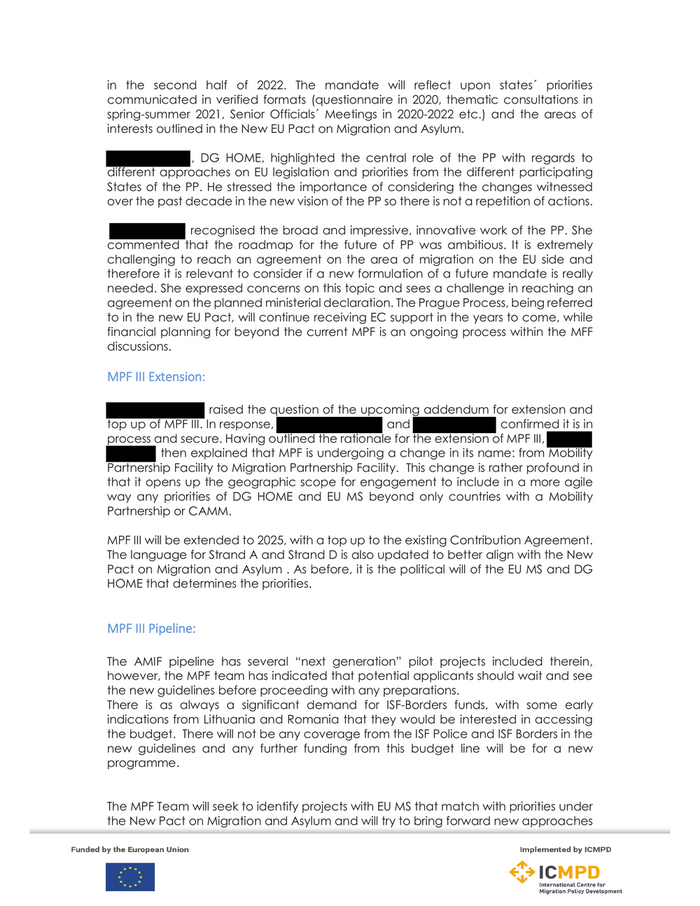
and perhaps regional or sectoral multi-state pilots aligned with the team Europe approach. MPF is expecting a new proposal from Germany and a possible follow up to the project Digital Explorers. Asked by to give some further details on the financing of MCP Med, confirmed that the project secured a confribution of EUR 2M from Denmark and that several other EU MS had indicated early interest in funding the initiative. Updating the MPF Communication Strategy: MPF will update its communication strategy with the objective to enhance its reputation and visibility vis-a-vis its target group and audience. To do so, MPF will undertake a 2-step approach consisting in a refresh of the dedicated MPF website and a change in the language used, and will consider the use of additional tools, as relevant, in order to align with the EC’s communication strategy. expressed an interest in organising a meeting with the Communication Unit of DG HOME. In repiy agreed on the added value of a joint communication meeting between MPF and DG HOME. The MPF team will await further instruction before proceeding and will work closely with DG HOME to ensure alignment. Monitoring and Evaluation Strategy: The MPF Monitoring and Evaluation Strategy needs to be updated in order to situate the programme more strongly in the current geopolitical context, as well as to allow more effective attribution of impact to the programme from the grants awarded. MPF is in the interview phase for the recruitment of a MEL Specialist who will support the preparation of a revised package of monitoring, evaluation and learning tools. The update will integrate: «e A new theory of change contextualising the geopolitical context in which the programme resides and making causal linkages for impact. «e An update to the MPF Logframe with the view to ensure that indicators and means of verification are updated and supporting the overall hierarchy of the framework. ‚DG HOME, highlighted the difference between evaluation of the MPF programme and evaluation of individual projects and asked for clarifications on what level of evaluation was being referenced. It was confirmed that the MPF Team is in the process of defining a ToR for evaluation of the MPF Il Strand D projects as a separate initiative to the new monitoring framework for the overall programme. The ToR has been shared with DG HOME in the meantime. ‚DG HOME, stressed the importance of aligning the MPF monitoring strategy to the context of the upcoming new MFF and suggested that as part of the update to the logframe the new AMIF (and other Decision) indicators be taken into account if possible to ensure alignment with the DG HOMEE strategy and context. Funded by the European Union Implemented by ICMPD N ] &>ICMPD International Centre for Migration Policy Development
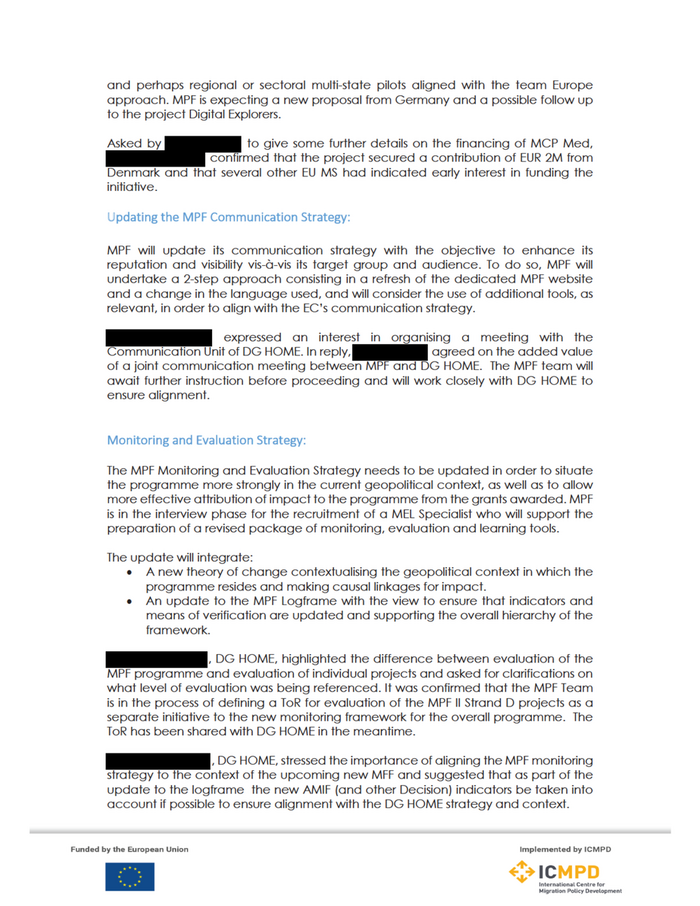
reminded the participants that MPF was not even asked to provide a logframe and that the one provided, was not a requirement in the first place. However, times are changing and we all see the value of a more robust framework. He outlined that in the new addendum, MPF would like to give a new impetus to the MEL strategy with an update to the MPF logframe. The new logframe should also effectively capture the non-grantmaking functions of the MPF project to EU member states such as mentoring, technical assistance, etc. Updated AWP: There were no major issues or delays in the overall delivery and the updated version circulated as part of the Steering Committee pack was confirmed. New Call for Proposals: The new call for proposals will remain a rolling call without deadline, to allow EU MS to apply when they are ready. There will be an increased focus from MPF in guiding applicants on a more strategic alignment to priorities and relevance at an early stage. For this reason, a two-step process is now proposed with a concept note stage and a later full application stage by invitation only. informed the participants that the new guidelines will be shared with the MPF SC for endorsement. commented that it is crucial to make sure that we bring in pragmatism, flexibility and more strategic alignment. The 2-step process with concept note is an important step in this direction to guide applicants already early on in order to fit better with partner countries needs and current priorities in migration dialogues. She noted the importance to assess the sustainability of projects linked with the level of cooperation at governance level, the timing and which MS are involved in order to ensure a more strategic choice of projects. also considered that there is a need to find additional ways to feed back the knowledge gained from the projects into DG HOME’s policy making in real time to build on lessons learned. Future perspectives: confirmed that the external dimension of the New Pact on Migration and Asylum was evolving and that the current priorities are in the EU’s Southern Neighbourhood as well as certain Silk routes countries. This is where we need to have a geographical diversification in Strand A and to bring in Talent Partnerships at a later stage as relations mature. Regarding the launch of the Talent Partnerships, , DG HOME, informed the meeting participants that 3 EU Commissioners (Margaritis Schinas, VP of the EC and EU Commissioner for Promoting our European Way of Life, Ylva Johansson, EU Commissioner for Home Affairs, and Nicolas Schmidt, EU Commissioner for Jobs and Social Rights) will attend the launch event scheduled for 11 June 2021. Commissioner Johansson will chair the event. There will be 2 sessions discussing Talent Partnerships from two angles: i) the link with overall migration dialogues with third countries and ii) the labour market perspective.
